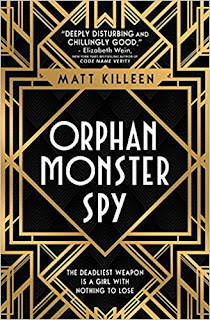Do
you love the final approach to midwinter, with its long evenings & slow
dawns? I do. I love the low shafts of light at sunset, and the small, magical
rituals of the Solstice.
At
this time of year our garden is endlessly busy with birds coming to the
feeders, although, sadly, night-time in the valley where I live is mostly
silent as the Tawney owls seem to have deserted us. Maybe they’ll return in
January, when the vixens bark and dog foxes trot over the crown of the hill.
Meanwhile,
the decorations are up, the fairy lights welcoming, and the complicated,
long-distance arrangements for collecting and visiting relatives more or less in
place. In quiet moments, the melancholia
of another year passing nudges at my elbow, but not for long.
This
year, especially, I’m looking back with gratitude to work of the NHS, and the amazing
care given to two of the people I love most in the world. I owe King’s College
Hospital, London, the Royal Surrey, Guilford, and Derriford in Plymouth more
than I can say.
Thanks,
too, are long overdue to everyone who has been part of my journey to publication
this year, but whom I didn’t acknowledge in the pages of The Goose Road, my debut novel.
This
omission was partly because the Author’s Note was already extensive as I wanted to
explain the origins of the story, particularly scientific discoveries about the
causes of the 1918-1919 Spanish Influenza pandemics, which became secondary to the
plot over time, but which, nevertheless, remained extremely important to me.
The
other reason I didn’t include my Acknowledgements is because the list of people
I have to thank is very long indeed.
High-time,
then, to make good on that lapse.
Where
to begin? Family
is traditional, so...
Thank you to my husband and son, and also my father, who were
always there, cheering me on, or, just as essential, not there, giving me space
to write. (Heroically, they ate a great deal pub food over the years so I didn’t
have to cook. Or shop. Or care very much about anything beyond the story.) Ta,
guys, you’re the best.
Thank
you very much, too, to talented writer besties, Eden & Lucy. Your advice,
your intelligence, your creativity, your emotional support - not least in
allowing me to let off steam - have been absolutely invaluable, as are your
continued friendship and help. (Thank goodness for all-inclusive phone packages,
otherwise we’d need best-sellers just to cover the costs of our calls.)
The
friendship and support of our cohort on the Bath Spa MA in writing for young
people has also been sustained, sustaining and fabulous. Thank you Jak, Sarah,
Chris, Irulan & Philippa, and our tutors: Marie-Louise, Prof David, Dr
Julia, Steve and Janine. Also the wider Bath Spa ‘mafia’ whose words of inspiration,
examples of tenacity, and shared knowledge about this roller-coaster ride have kept
so many of us keeping on for years.
Then
there’s SCBWI-BI. What an organisation! I can’t name every Scooby to whom I owe
a debt of gratitude (basically, you’re all brilliant) but I have to say a special
thank you to Jan, Candy, Lesley, Yona, Elaine, Jenny and Amelia. There are so
many more Scoobies I should include. Thank you all.
And there’s
more! Like the lovely people at the Golden Egg Academy, Imogen and Ness,
Maurice and Beverley, especially, and fellow eggitors and writers. I wish you all the best luck in the world.
And
Team BookBound UK. One weekend together forged years of friendship and mutual
practical and emotional support. Hugs to everyone.
A
special shout out, too, to Liz, who joined fellow BBer & Scoobie, Tracey,
& me in planning a debuts’ book tour, and made our Interesting Times in
Scotland a fantastic first occasion. I loved our talks and hope to share more adventures
around the UK next year.
There
are so many other people I want to thank, like everyone who came to my launch
party, and Sarah Mussi, Charlie Shepard, the entire Winchester Writers’
Festival crowd from way back, the York conference, too, Emma Darwin, Histeria (Mwa! Sue and Ally) and,
and, and...
Before
I stop, a final huge thank you to my superb Walker editors, Mara and Frances, and my fantastic
agent, Jane Willis of United Agents. You have been stars in this extraordinary
year. I am deeply grateful that, through you, Angelique’s story has travelled the
world, and (fingers crossed) will continue to find new readers for a long time
to come.
At
the moment I’ve stepped back from writing Book 2 for reasons to do with the day
job, but on my commute (which, to be honest, is to die for, along winding country
roads, close to the sea) I think about my characters a lot: their families, their
hopes and fears, and how it’s all going to meld together in a meaningful way in
the end.
Sometimes
I’m sad that I can’t afford to write their stories full-time any more, but there we
are. Needs must. Anyway, in my heart I remain a full-time member of our writing
community. A paid-up, card-carrying citizen of the Republic of Letters.
So
Happy Christmas, everyone, and very best wishes for the New Year.
Wherever
you are on your writer’s journey, I hope Santa brings you an agent, a contract,
a lovely editor, great reviews, solid sales, and the time and mental space to
continue to do what you love.
PS I had a lovely seasonal cat picture as a sign-off but my broadband link couldn't cope. Soz :-(










